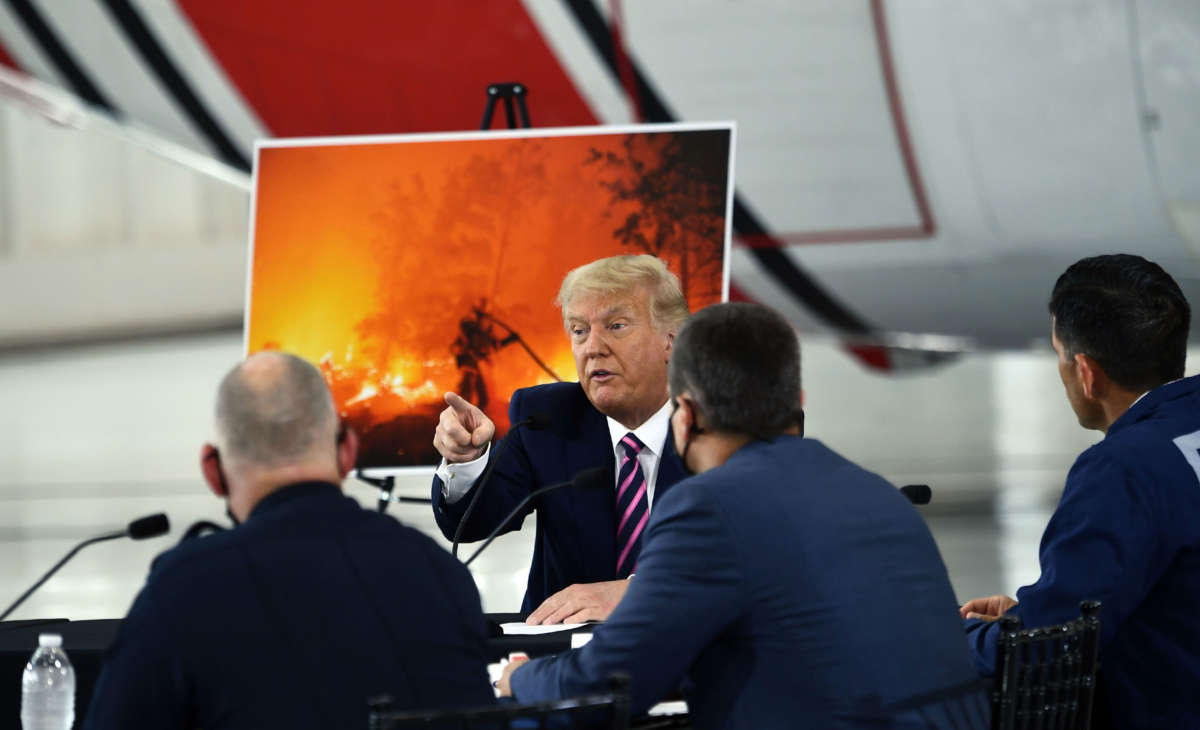Support justice-driven, accurate and transparent news — make a quick donation to Truthout today!
President Donald Trump has made emergency declarations related to the wildfires seen in California, Oregon and Washington, but he hasn’t dedicated much time to the underlying issue of climate change, which is largely responsible for the prominence of widespread fires in the first place.
Instead, Trump has speculated, without evidence of any kind, that it’s forest management practices by the states where fires are located that’s to blame — in spite of the fact that much of the affected areas are federally managed.
But according to those with knowledge of the president’s thinking, Trump isn’t truly concerned about forest management at all, and his reluctance to pay much mind to those affected by wildfires may be driven by his politics.
Trump this week had a back-and-forth with California National Resources Secretary Wade Crowfoot, who suggested the president ought to confront climate change as a reason why wildfires have been worse in recent years, compared to years past.
“If we ignore that science, and sort of put our head in the sand, and think it’s all about vegetation management, we’re not going to succeed together protecting Californians,” Crowfoot said to Trump.
The president disagreed, suggesting that climate will “start getting cooler” soon.
“I wish science agreed with you,” Crowfoot said.
“I don’t think science knows,” Trump responded.
During an interview with “Fox & Friends” hosts on Fox News on Tuesday, Trump doubled down on his climate change denial, putting blame once again on the Golden State for the wildfires that were happening there.
“You have forests all over the world. You don’t have fires like you do in California,” Trump said.
In truth, many areas across the globe are seeing more problems with wildfires than they have in the past, including in South America, Australia and central Asia in particular. And in spite of the president’s assertions, Europe, too, saw a much higher rate of wildfires last year than it had seen on average during the 10-year span that preceded 2019.
Trump has argued in the past in favor of better forest management practices. In 2018, for example, he used the idea to criticize California when it was similarly battling wildfires at the time. But former White House officials have spoken out against Trump’s statements, from then and now, telling The Independent that his refusal to acknowledge climate change, as well as his criticisms about forest management, were more likely centered on a political vendetta against states he sees as being in opposition to his presidency.
“He doesn’t care one bit about managing forests — or much of anything for that matter — unless he can spin it as a failure of governance under the Democratic Party,” a former staffer in the White House familiar with Trump’s thinking said.
Former Department of Homeland Security Chief of Staff Miles Taylor echoed those sentiments, adding that Trump’s anger isn’t just with politicians and lawmakers, but also against voters from western states that didn’t support him in 2016. Taylor told The Independent, for example, that the president had withheld some assistance to Californians specifically because they voted against him in the 2016 election.
“He didn’t want the people in California to get the money, because he basically said he didn’t think that they deserved it,” Taylor explained, adding that Trump had said something along the lines of, “If they don’t support me, I’m not gonna support them” when it came to people in that state specifically.
Trump lashed out at both former Gov. Jerry Brown and current Gov. Gavin Newsom, both Democrats, Taylor recounted, during his time at DHS.
“It was a very clear political statement of him saying that if the past two governors aren’t supporting me, and the people of California don’t like me politically … do not provide money, don’t provide disaster relief,” the former DHS official added.
A terrifying moment. We appeal for your support.
In the last weeks, we have witnessed an authoritarian assault on communities in Minnesota and across the nation.
The need for truthful, grassroots reporting is urgent at this cataclysmic historical moment. Yet, Trump-aligned billionaires and other allies have taken over many legacy media outlets — the culmination of a decades-long campaign to place control of the narrative into the hands of the political right.
We refuse to let Trump’s blatant propaganda machine go unchecked. Untethered to corporate ownership or advertisers, Truthout remains fearless in our reporting and our determination to use journalism as a tool for justice.
But we need your help just to fund our basic expenses. Over 80 percent of Truthout’s funding comes from small individual donations from our community of readers, and over a third of our total budget is supported by recurring monthly donors.
Truthout has launched a fundraiser to add 340 new monthly donors in the next 5 days. Whether you can make a small monthly donation or a larger one-time gift, Truthout only works with your support.
